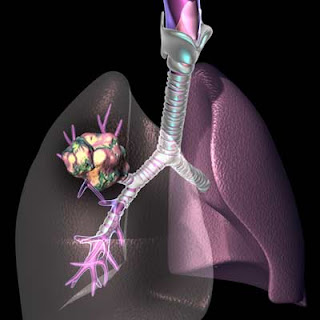Mesothelimia Symptoms and Signs of mesothelioma may not appear until 20-50 years (or more) after exposure to asbestos. Shortness of breath, cough and pain in the chest by an accumulation of fluid in the pleural space (pleural effusion) are often symptoms of pleural mesothelioma.
Symptoms of peritoneal mesothelioma are weight loss and cachexia, abdominal swelling and pain due to ascites (accumulation of fluid in the abdominal cavity). Other symptoms of peritoneal mesothelioma can bowel obstruction, blood clotting abnormalities, anemia and fever. If the cancer has spread beyond the mesothelium to other parts of the body, symptoms may include pain, difficulty swallowing, or swelling of the neck or face.
Mesothelioma is a tumor (cancer) benign (not cancerous) or malignant in the mesothelium, a protective lining around most of the organs in the body begins. Most mesothelioma begin in the pleura (the membrane that surrounds the lungs and chest cavity lining) or peritoneum (mesothelial tissue that covers most organs in the abdominal cavity). Symptoms of mesothelioma vary depending on where the tumor is located.
These symptoms can be caused by mesothelioma or by other, less serious conditions.
Mesothelioma that affects the pleura can be signs and symptoms:
Chest wall pain
Pleural effusion, or fluid surrounding the lung
Shortness of breath
Fatigue or anemia
Wheezing, hoarseness, or cough
Blood in the sputum (fluid) cough (hemoptysis)
In severe cases, people may have many tumor masses. The person may develop a pneumothorax, or collapsed lung. This disease may metastasize, or spread to other parts of the body.
Tumors that affect the abdominal cavity often do not cause symptoms until they are at the final stage. Symptoms include:
Stomachache
Ascites, or abnormal accumulation of fluid in the abdominal cavity
A mass in the abdomen
Problems with bowel function
Weight loss
In severe cases of the disease, the following symptoms must be present:
Blood clots in the veins, which may cause thrombophlebitis
Disseminated intravascular coagulation, a disorder causing severe bleeding in many body organs
Jaundice, or yellowing of the eyes and skin
Low blood sugar level
Pleural effusion
Pulmonary emboli, or blood clots in the arteries of the lungs
Severe ascites
To deploy mesothelioma usually not to the bone, brain, or adrenal glands. Pleural tumors are usually found only on one side of the lungs.
Popular Posts
-
UNITED KINGDOM - The Pictures Death of Princess Diana of Wales Princess. On August 31, 1997, Diana died, the Princess of Wales, as a result...
-
UNITED STATES - Nebraska Girl Teresa Scanlan Win MISS AMERICA 2011. The Miss America 2011 has been around 90 years, but Miss Nebraska had n...
-
LOS ANGELES, UNITED STATES - Harry Potter the Deathly Hallows MOVIE. Harry Potter and the Deathly Hallows Movie showed the greatest spell w...
-
UNITED STATES - HEIDI MONTAG is The Beautiful American Girl. Heidi Blair Pratt Montag (born Monday, was born on September 15, 1986) is an A...
-
UNITED STATES - The Cars 2 Race MOVIE Release June 24th 2011. Cars 2 is a 2011 American computer-animated film produced by Pixar Animation ...
-
Malignant Mesothelioma is a disease in which lies malignant (cancer) cells in the mesothelium, a thin layer of tissue that covers most orga...
-
Asbestos is a set of six natural silicate minerals of commercial for the desired physical properties are exploited. They all have their com...
-
Cupertino, California - UNITED STATES for Apple iCloud. May 31th, 2011 Apple ® CEO Steve Jobs and a team of Apple executives kick off the a...
-
UNITED STATES - The Fast and Furious Fast Five Action MOVIE 2011. Fast Five (alternatively Fast Furious Fast Five known and The Furious 5 o...
-
Fort Worth - United States for America Bad Weather. Bad Weather come to Dallas America Three rounds of storms swept through North Texas on ...
Categories
Diberdayakan oleh Blogger.



















0 komentar:
Posting Komentar